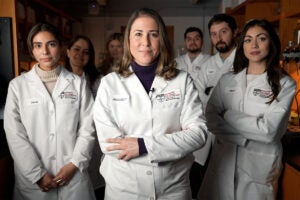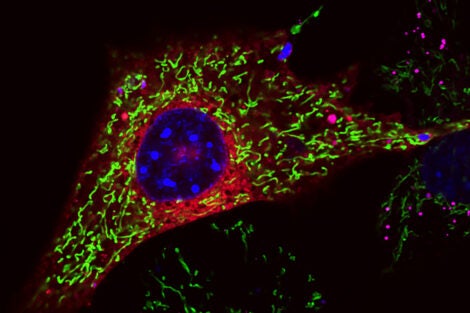February 7, 2024—Scientists at Harvard T.H. Chan School of Public Health are peering deep inside lymph nodes to learn more about how cancer cells spread—and whether we may someday be able to halt metastasis through dietary modifications.
Jessalyn Ubellacker, assistant professor of molecular metabolism, has previously shown that when melanoma cells migrate to lymph nodes, they pick up a coating of protective fats that lets them avoid damage and slip easily through the bloodstream, enabling metastasis. Now, she’s taking a closer look at that process, investigating what happens to metabolite and lipid levels in the lymph nodes of patients with cancer.
“What are the specific changes cancer cells undergo in the lymph nodes, and can they enable us to predict whether a cancer will be more or less aggressive? Or more or less responsive to treatment?” she said.

Lymph nodes are naturally high in a particular dietary fatty acid—oleic acid—because most of the fats we eat get absorbed through the lymphatic system. Cancer cells appear to incorporate that oleic acid into their membranes, creating a protective shield.
Ubellacker wants to know whether consuming foods like olive oil, which is high in oleic acid, alters the lymph node microenvironment—and if so, if this could help cancer cells progress to metastasis. She’s quick to emphasize that she’s not challenging studies showing the protective impact of consuming healthy fats such as olive oil in place of animal fats. Instead, her lab is trying to identify whether in some circumstances, that dietary advice might need to be adjusted.
“Think about it,” she said. “All the cells in your body are benefiting from those good factors and nutrients, and cancer cells are going to take advantage of all those factors as well. That’s begs the key question we need to address—how can the dietary uptake of those factors change the lymph node environment, and how does that affect cancer metastasis?”
Photos: Cell image: Mario Palma, Ubellacker Lab; Lab members: Anna Webster
